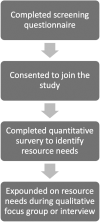Active Treatment to Survivorship Care: A Mixed-Methods Study Exploring Resource Needs and Preferences of Young Adult Cancer Survivors in Transition
- PMID: 36706031
- PMCID: PMC10618808
- DOI: 10.1089/jayao.2022.0095
Active Treatment to Survivorship Care: A Mixed-Methods Study Exploring Resource Needs and Preferences of Young Adult Cancer Survivors in Transition
Abstract
Purpose: The purpose of this study was to identify resource needs and preferences of young adult cancer survivors (YAs) during the transition from active treatment to survivorship care to inform tailored care tools to support YAs during this period. Methods: A mixed methods study following a sequential explanatory approach was conducted among YAs between the ages of 15 and 39. Online surveys were distributed to assess participant information and resource needs, and responses were further explored during virtual focus group and interview discussions. Frequencies and proportions were calculated to identify quantitative resource needs, and a descriptive qualitative approach was used to gather and analyze qualitative data. Results: Thirty-one participants completed the online surveys, and 27 participated in qualitative data collection. The top resource needs identified in the surveys and discussed in focus groups and interviews were (1) fear of recurrence, (2) sleep and fatigue, (3) anxiety, (4) nutrition, (5) physical activity, and (6) finances. Emergent themes identified during transcript analyses included the need for (1) tailored, customizable resources, (2) connection with other survivors, (3) tools to guide conversations about cancer, (4) clarity in what to expect during treatment and survivorship, and (5) consistent and equitable care in YA oncology. Conclusions: Participants identified six important information needs in addition to an overarching need for tailored support and equitable distribution of resources while transitioning into early survivorship. Thus, tailored interventions are needed to enhance the distribution of YA-centered resources, improve equity in YA cancer care, and connect YAs with peer survivors.
Keywords: early survivorship; survivorship care; transition; young adults.
Conflict of interest statement
Authors L.L., A.S., and M.M. are employed by the Lineberger Comprehensive Cancer Center.
Figures
Similar articles
-
The Audacity of Engagement: Hearing Directly from Young Adults with Cancer on Their Attitudes and Perceptions of Cancer Survivorship and Cancer Survivorship Research.J Adolesc Young Adult Oncol. 2018 Feb;7(1):103-111. doi: 10.1089/jayao.2017.0038. Epub 2017 Oct 12. J Adolesc Young Adult Oncol. 2018. PMID: 29022839
-
Improving Symptom Management for Survivors of Young Adult Cancer: Development of a Novel Intervention.J Adolesc Young Adult Oncol. 2023 Aug;12(4):472-487. doi: 10.1089/jayao.2022.0100. Epub 2022 Sep 30. J Adolesc Young Adult Oncol. 2023. PMID: 36178972 Free PMC article. Clinical Trial.
-
Preferences for cancer survivorship care among adolescents and young adults who experienced healthcare transitions and their parents.J Cancer Surviv. 2019 Aug;13(4):620-631. doi: 10.1007/s11764-019-00781-x. Epub 2019 Jul 4. J Cancer Surviv. 2019. PMID: 31273639
-
Psychosocial Factors Affecting Wellbeing and Sources of Support of Young Adult Cancer Survivors: A Scoping Review.Nurs Rep. 2024 Dec 14;14(4):4006-4021. doi: 10.3390/nursrep14040293. Nurs Rep. 2024. PMID: 39728654 Free PMC article.
-
Perspectives of adolescent and young adult cancer survivors: review of community-based discussion boards.J Cancer Surviv. 2022 Oct;16(5):1079-1089. doi: 10.1007/s11764-021-01098-4. Epub 2021 Sep 2. J Cancer Surviv. 2022. PMID: 34471949 Review.
Cited by
-
Young Adult Cancer Survivors' Perspectives on Cancer's Impact on Different Life Areas Post-Treatment: A Qualitative Study.J Adolesc Young Adult Oncol. 2024 Oct;13(5):748-759. doi: 10.1089/jayao.2024.0021. Epub 2024 May 2. J Adolesc Young Adult Oncol. 2024. PMID: 38695773
References
Publication types
MeSH terms
Grants and funding
LinkOut - more resources
Full Text Sources
Medical


